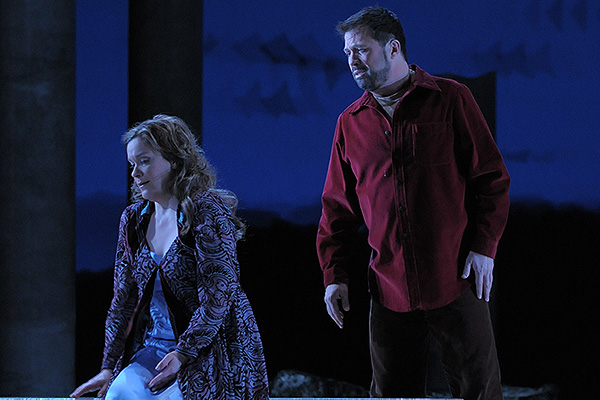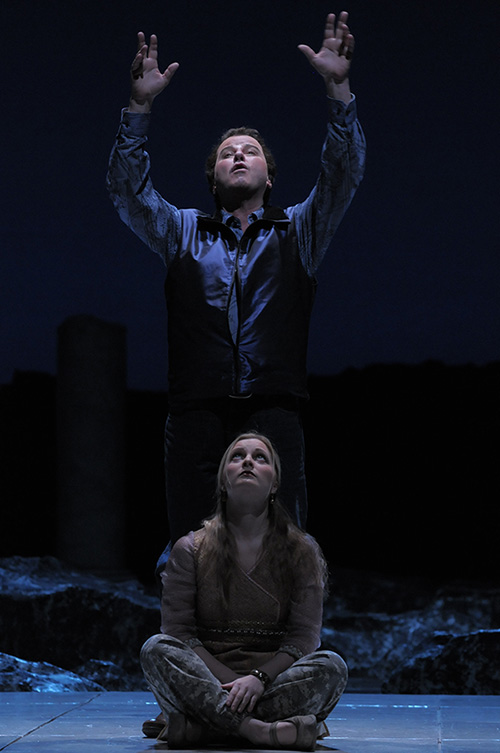-
Moments of Discovery: Delving deeper into Hercules
By Danielle D'OrnellasPosted in Hercules
By Claire Morley, Associate Manager, Editorial
If opera is a profoundly collaborative art form, it could hardly ask for a better keeper than Peter Sellars. “I don’t think of myself as a director ever,” he explains. “You have amazing people in the room – brilliant singers, composer, and usually somebody who wrote pretty amazing words. You have visual art and you have movement. Somebody has to invite all these elements to meet in interesting ways, to take risks and actually have a conversation about something that is difficult and not obvious. All of these complicated interactions need someone to help negotiate the exchange – my job is to be useful in those conditions.”
Sellars’ collaborative approach is especially evident in Hercules, allowing all five singers in this production (Eric Owens, Alice Coote, David Daniels, Richard Croft, Lucy Crowe) to establish a powerful rapport and chemistry that is rare to witness on stage. This is the second time this cast and creative team have worked together on Hercules, the first occurring in 2011 when the production premiered at Lyric Opera of Chicago and was called psychologically penetrating and spellbinding” (LA Times). Having the chance to see them work together again is to Toronto’s advantage.
As Sellars points out, “We can go further. The first time you’re just trying to pull it together; the second time out you can say ‘Okay, we know what this is, now let’s go much deeper.’”
 Even before arriving in town for rehearsals, the cast began revisiting their roles as they prepared to work together as a team again. As Alice Coote (Dejanira) put it, “I can’t wait to see the cast of Hercules again. The profundity of the piece means we get kind of close!” And Lucy Crowe, who portrays prisoner of war Iole says, “Having lived with the role for the past three years, the character has developed further in my mind. I think about her – I
will watch the news and see victims of war, unfortunately too often. This adds to the depth of the emotions with which I portray her.”
Even before arriving in town for rehearsals, the cast began revisiting their roles as they prepared to work together as a team again. As Alice Coote (Dejanira) put it, “I can’t wait to see the cast of Hercules again. The profundity of the piece means we get kind of close!” And Lucy Crowe, who portrays prisoner of war Iole says, “Having lived with the role for the past three years, the character has developed further in my mind. I think about her – I
will watch the news and see victims of war, unfortunately too often. This adds to the depth of the emotions with which I portray her.” In fact, Hercules conductor Harry Bicket, who was also part of the 2011 Chicago team, considers Iole’s first aria (“Daughter of Gods, Bright Liberty!”) to be a particularly moving moment. Iole has been captured and, in Sellars’ production, sings her aria about freedom while chained, wearing an orange jump suit and black hood. Bicket recalls, “We were worried people might be offended, but Peter’s take was actually that, for instance, when an American president or defense minister talks about freedom and what it means to go liberate another country, it has a very different resonance to somebody who is tied up and being tortured. I’m not someone who thinks that all opera should be directly political – this is more of a human issue, and I think that speaks to people of any political persuasion.”
As Bicket points out, “One of the advantages of Handel is that the score is really just a sketch – you aren’t given exact instructions the way you would with a piece by Stravinsky or Strauss. With Handel, in many ways, it’s more open.” Sellars adds, “What’s so beautiful about Baroque music is you can sing it in an extremely personal way – it’s very improvisatory. Each performer creates something that is quite personal – you witness somebody searching their own heart and finding their own confession, moment of discovery, and moment of recognition.” Aiding in the search for these moments is, according to David Daniels (Lichas), what makes Sellars particularly strong at directing Handel operas. “Peter makes everything so relevant, the way Handel is also very relevant the way he writes his music and characters. People really connect with Handel emotionally.”
Eric Owens (Hercules) echoes Daniels’ sentiments, and recalls that at the end of rehearsals in Chicago, “sometimes we would all just be crying. Peter does not direct to provide comfort to his audiences – he directs to make things relevant to them.” Ultimately, these intense experiences translate into something that can be felt by artists and audience alike. And delving this deeply into the opera and each role requires profound levels of trust between everyone involved, allowing for the creation of that magical rapport we witness on stage. When it comes time to perform, Richard Croft (Hyllus) says that “Going out on stage is a lot like going into battle. It���s good to know that Harry will be there for us in the pit.”
Says Bicket, “Anyone who has ever done a show with Peter thinks it’s the best thing they’ve ever done. He has a wonderful ability to make people feel what they are doing is really important.”
This article also appears in our Hercules house program.
Photos: (top) Alice Coote as Dejanira and David Daniels as Hyllus; (middle) Richard Croft as Hyllus and Lucy Crowe as Iole. All production photos from the COC/Lyric Opera of Chicago (LOC) co-production of Hercules, 2011, LOC. Photos: Dan Rest
